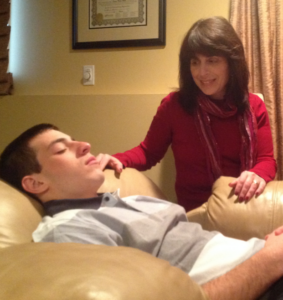


Video: Physician lost 32 lbs
Physician lost 32 lbs with virtual gastric band program. [info]

Can weight loss be achieved through hypnotherapy
 Can Weight Loss Be Achieved Through Hypnotherapy? Many of us struggle to lose weight through traditional dieting, but could hypnotherapy for weight loss provide the solution we’re looking for?
Can Weight Loss Be Achieved Through Hypnotherapy? Many of us struggle to lose weight through traditional dieting, but could hypnotherapy for weight loss provide the solution we’re looking for?
We all know that being overweight can be bad for your health, increasing the risk of serious conditions such as Type 2 Diabetes, cancer, stroke and cardiovascular disease, but, as the statistics show, losing weight isn’t always as easy as it sounds. So, what are our options when traditional dieting lets us down?
For a growing number of people, the answer lies in a slightly unconventional but increasingly popular dieting method – hypnotherapy for weight loss. But what exactly is hypnotherapy for weight loss, and does it actually work?
Mind over matter
The human brain is a powerful tool, and weight loss hypnotherapy aims to harness this power to help clients to think themselves thin and achieve meaningful and long-lasting weight loss.
The treatment centers around visualization – a process that is proven to have a noticeable physical impact on the body. For example, when we think about  something upsetting or stressful, our bodies release adrenaline and tense up, whereas, if we visualize a pleasant and relaxing scenario, we find that our muscles relax automatically.
something upsetting or stressful, our bodies release adrenaline and tense up, whereas, if we visualize a pleasant and relaxing scenario, we find that our muscles relax automatically.
With hypnotherapy for weight loss, clients are walked through a number of visualization techniques, which can help to re-calibrate the signals that control digestion and feelings of fullness.
The treatment culminates with clients being taken through the visualization process of getting a gastric band fitted – offering them the benefits of surgery without going under the knife.
Tackling the root causes
However, hypnotherapy for weight loss involves a lot more than just visualization techniques. There can be many complex issues underlying a person’s weight gain, and it is these issues that weight loss hypnosis aims to identify and resolve.
By combining traditional hypnotherapy with Cognitive Behavior Therapy, Neurolinguistic Programming, and other recognized counselling techniques, therapists are able to tackle the root cause of the problem, supporting clients to retrain their cognitive thinking and develop a healthier relationship with food and eating.
 Long-term lifestyle change
Long-term lifestyle change
What makes weight loss hypnotherapy so effective is that it takes a holistic approach, targeting a long-term lifestyle change rather than a short-term weight loss that is impossible to maintain for any significant length of time.
Weight problems are treated as a psychological rather than solely physical issue and, when combined with follow-up diet and nutrition advice, this empowers clients to make permanent, healthy changes to their lifestyle and achieve their weight-loss goals.
A safe solution
As with any diet, the amount of weight lost will vary from person to person, but research has shown that weight loss hypnotherapy can be a hugely effective treatment, with some clients reporting losses of 100 pounds, while others have lost over half of their body weight!
If you’re struggling to lose weight and are looking for a safe and effective alternative to gastric band surgery, hypnotherapy for weight loss could be the solution you’re looking for.
By: Women Fitness Magazine

US NEWS: Can hypnosis help you lose weight?
 Melissa Cipriana had no explanation left for why she couldn’t lose weight. She avoided processed foods, “white” carbohydrates and soda. She attended SoulCycle classes religiously. And she certainly had discipline: She had already lost – and kept off for years – 50 pounds through a medically supervised hCG diet, which involves eating less than 800 calories a day and receiving injections of a hormone marketed to suppress appetite.
Melissa Cipriana had no explanation left for why she couldn’t lose weight. She avoided processed foods, “white” carbohydrates and soda. She attended SoulCycle classes religiously. And she certainly had discipline: She had already lost – and kept off for years – 50 pounds through a medically supervised hCG diet, which involves eating less than 800 calories a day and receiving injections of a hormone marketed to suppress appetite.
And yet, the last 20 or 30 pounds simply wouldn’t come off. Only one possibility remained: “I knew it had everything to do with my thoughts,” says Cipriani, a 38-year-old resort CEO who splits her time between Denver and Granby, Colorado.
So Cipriani booked a session with a local hypnotherapist, whom she’d heard about through a Facebook friend and connected with via phone. “We didn’t talk about food, we didn’t talk about diet or calories in versus calories out … she was more like changing my mindset,” recalls Cipriani, who was living in New York City at the time, of her first session.
More specifically, at some sessions, Cipriani was guided into a state of deep relaxation. There, she was encouraged to discover and confront some of the mental and emotional barriers like overthinking and over-researching diet choices that had been preventing her from reaching her goals. She later integrated phrases like “I easily and effortlessly lose weight” into her psyche.
Six months later, she’d lost at least 10 pounds.”Once I broke down the barrier of ‘overthinking it’ and just accepted that I easily and effortlessly lose weight, it just came off – I knew the choices I was making were the right choices for me.” says Cipriani, who focused on eating whole foods like lean proteins, healthy fats and whole grains, and worked with a personal trainer. She eventually lost the rest of the weight and has maintained it to this day, about four years later.
Cipriani also credits hypnotherapy, which she continues to use in various forms including apps and self-hypnosis, with allowing her to meet her now-husband and cope with work stress. “I really do obviously believe [in hypnotherapy] … I have a fuller life because of it,” Cipriani says.
How Does Hypnosis Work?
Despite lingering misperceptions, hypnosis actually looks and acts a lot more like mindfulness meditation or cognitive behavioral therapy than mind control or a magic show. Like meditation, it involves getting into a  very relaxed, focused state; like CBT, it involves noticing and challenging negative thought patterns.
very relaxed, focused state; like CBT, it involves noticing and challenging negative thought patterns.
“It’s not like you’re going to get hypnotized and you’re not going to know who you are and you’re going to be made to do something by someone,” says Eric Spiegel, a clinical psychologist in the greater Philadelphia area who serves as president of the American Society of Clinical Hypnosis. “I’m going to offer you ideas and choices and let you lead the way, but I’ll kind of help you figure out the path.”
But one key characteristic that can make hypnosis work more swiftly and powerfully than more widely accepted practices is also what keeps it somewhat shrouded in mystery: It works on the subconscious level, and researchers don’t know exactly how, says David Godot, a clinical psychologist in Long Beach, California, who serves as secretary of the Society of Psychological Hypnosis, a division of the American Psychological Association.
“With hypnosis, you get into a particular state of mind where there’s a closeness between the contents of the conscious and unconscious awareness,” he explains. When you’re in it then, your conscious mind or a practitioner can offer suggestions to your subconscious mind. For example, Grace Smith, Cipriani’s Vero Beach, Florida-based hypnotherapist, might have clients looking to break unhealthy eating habits repeat, “Food is fuel. I only put the highest quality food into my body.” Occasionally, she uses “aversion therapy,” too, in order to create a negative association with a food or drink that has a deep-seeded positive association – cupcakes that used to be tied to comfort are now tied to disgust.
The idea is that by feeding these thoughts to your subconscious, you can change deeply rooted behaviors without so much conscious effort, just like you may awake from a dream with a solution to a complicated problem, or may experience a lightbulb moment while zoning out in the shower. “There’s this creative part of your mind that’s working all the time while you’re not aware of anything else,” Godot says. Through hypnosis, he adds, “that creative process can be directed to work on this particular problem.”
Proceed With Cautious Optimism
There’s some research on hypnosis for weight loss, and the results are moderately promising. One 2005 review in the International Journal of Obesity found that, taken together, the stronger studies on hypnosis for weight loss have shown that hypnotherapy leads to more dropped pounds than either cognitive behavioral therapy or dietary advice alone.
Another 2009 study concluded that hypnosis was among the only three evidence-based complementary treatments for obesity, but that if used at all, it should be used alongside tried-and-true calorie restriction and exercise. As the American Society of Clinical Hypnosis puts it, hypnosis “is of major benefit to some patients with some problems, and it is helpful with many other patients, but it can fail, just like any other clinical method.”
Whether it works for you may come down to your personality and fit with a provider, among other individual characteristics. Specifically, certain people are highly “hypnotizable” (if you easily get lost in thought or are artistically inclined, you may be one of them), and some people are especially vulnerable to suggestion under hypnosis (including people who are deemed “gullible” in conscious life), Spiegel explains. The higher you are on these traits, the faster and more effectively hypnosis will likely work, though people lower on the scales can benefit too.
You also have to truly want a particular outcome for hypnosis to work, Smith says. For example, if you say you want to quit your nighttime ice cream habit but actually love the taste and find the ritual soothing, you won’t have as much luck as someone who hates feeling compelled to eat ice cream nightly – even though he no longer enjoys it. “You need a goal [because] how much you want the result is the No. 1 thing that will dictate the results you get,” says Smith, author of the new book, “Close Your Eyes, Get Free,” which aims to make hypnosis mainstream by teaching people how to do it to themselves.
 Even if you do have a natural affinity for hypnosis and a genuine goal, finding an appropriately trained therapist who’s right for you can be complicated since there’s no single credentialing organization, state licensing rules differ (when they exist at all) and hypnotherapists may include physicians, nurses, dentists, social workers, psychologists and regular Joes. “All the time I see people who will say things like, ‘I’m a certified hypnotherapist,'” Spiegel says. “The question is, ‘OK, what are you certified in and what is your professional degree and do you have a license?'”
Even if you do have a natural affinity for hypnosis and a genuine goal, finding an appropriately trained therapist who’s right for you can be complicated since there’s no single credentialing organization, state licensing rules differ (when they exist at all) and hypnotherapists may include physicians, nurses, dentists, social workers, psychologists and regular Joes. “All the time I see people who will say things like, ‘I’m a certified hypnotherapist,'” Spiegel says. “The question is, ‘OK, what are you certified in and what is your professional degree and do you have a license?'”
Asking those questions – in addition to gauging your rapport with the potential therapist and inquiring about the hours they spent in training and in practice – is important because hypnotherapy can uncover forgotten traumatic experiences. Under the care of an unprepared provider, that experience can feel traumatic all over again rather than empowering. Godot’s rule of thumb for hypnotherapists? “Don’t use hypnosis to treat anything you wouldn’t otherwise be qualified to treat,” he says.
Good training is also important because hypnosis isn’t just about reading from a script, it’s about learning how language, pacing and tone of voice lead to the desired outcome, Spiegel says. Hypnotic suggestions or affirmations need to be positive – “I choose healthy portion sizes” rather than “I don’t overeat” – since the unconscious mind doesn’t “hear” the negative, and instead reinforces “I overeat,” says Smith, who is not a health care professional but became certified by several organizations including the International Hypnosis Federation before launching her own hypnotherapy training school.
Finally, the therapist’s philosophy matters since professionals differ, for instance, on whether it’s harmful or hurtful to instill beliefs that foods are “good” or “bad.” While Smith finds those types of mantras help break associations that are no longer helpful, other hypnotherapists like those at NY Health Hypnosis and Integrative Therapy in Manhattan do the opposite for people trying to lose weight or overcome eating disorders. “The goal is not just to end the addiction, but also to stop viewing food in terms of good and bad so that a person gets out of the cycle of overindulging and self-blame,” the therapists say on their website. Here too, knowing what resonates with you matters.
All caveats considered, health professionals say hypnosis can be powerful for life-long behavior change and no more risky than meditation or yoga. “Hypnosis is not some magical practice that is to be feared,” Godot says. “It’s just a set of techniques and tools to get closer to understanding … what’s happening in the mind.”
By: Anna Medaris Miller, Staff Writer

Research Validates Weight Loss Hypnosis
Hypnosis has been an effective tool in the obesity battle. Here are 4 studies supporting the effect of weight loss hypnosis.
 Weight loss continues 2 years later: 109 people completed a behavioral treatment for weight management either with or without the addition of hypnosis. At the end of the 9-week program, both interventions resulted in significant weight reduction. At 8-month and 2-year follow-ups, the hypnosis subjects were found to have continued to lose significant weight, while those in the behavioral-treatment-only group showed little further change. (Journal of Consulting and Clinical Psychology)
Weight loss continues 2 years later: 109 people completed a behavioral treatment for weight management either with or without the addition of hypnosis. At the end of the 9-week program, both interventions resulted in significant weight reduction. At 8-month and 2-year follow-ups, the hypnosis subjects were found to have continued to lose significant weight, while those in the behavioral-treatment-only group showed little further change. (Journal of Consulting and Clinical Psychology)
Weight loss hypnosis 30 times more effective: Researchers investigated effects of hypnosis in weight loss for 60 females who were at least 20% overweight. Treatment included group hypnosis with metaphors for ego-strengthening, decision making and motivation, ideomotor exploration in individual hypnosis, and group hypnosis with maintenance suggestions. Hypnosis was more effective than a control group 17lbs vs. 0.5 lbs on follow-up. (Cochrane, Gordon; Friesen, J 1986)
Hypnosis clients lost more than 90% of non-hypnosis clients: Researchers analyzed 18 studies comparing a cognitive behavioral therapy, such as relaxation training, guided imagery, self-monitoring or goal setting with the same therapy plus hypnosis. Those who received the hypnosis lost more  weight than 90 percent of the non-hypnosis, and maintained the weight loss two years after treatment ended. (Allison DB, Faith MS. 1996)
weight than 90 percent of the non-hypnosis, and maintained the weight loss two years after treatment ended. (Allison DB, Faith MS. 1996)
Hypnosis doubles effect of dieting: An analysis of five weight loss studies reported in the Journal of Consulting and Clinical Psychology in 1996 showed that hypnosis can more than double the effects of traditional weight loss approaches. (Journal of Consulting and Clinical Psychology in 1996)
Contact Paul for a free consultation: 888-290-3972 // info@burlingtonhypnosis.com
Video: Understanding Virtual Gastric Band Weight Loss









